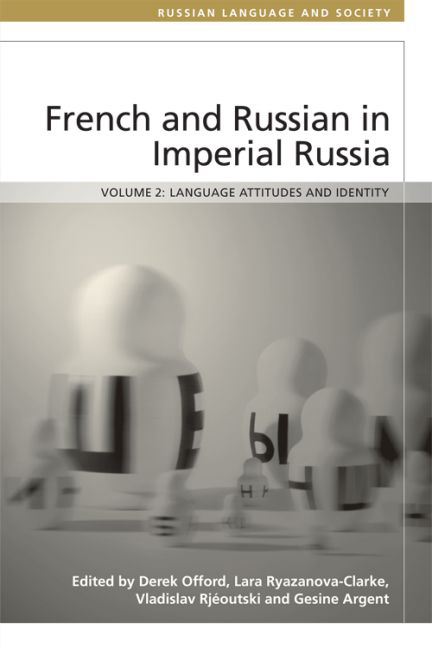Book contents
- Frontmatter
- Contents
- Preface
- Note on Dates, Transliteration and Other Editorial Practices
- Abbreviations Used in the Text, Notes and References
- Dates of Reigns in Eighteenth- and Nineteenth-Century Russia
- Dedication
- Introduction
- 1 The Pan-European Justification of a Multilingual Russian Society in the Late Eighteenth Century
- 2 Princess Dashkova and the Politics of Language in Eighteenth-Century Russia
- 3 Plating ‘Russian Gold’ with ‘French Copper’: Aleksandr Sumarokov and Eighteenth-Century Franco-Russian Translation
- 4 Francophone Culture in Russia Seen through the Russian and French Periodical Press
- 5 Linguistic Gallophobia in Russian Comedy
- 6 The Linguistic Debate between Karamzin and Shishkov: Evaluating Russian–French Language Contact
- 7 Language and Conservative Politics in Alexandrine Russia
- 8 Seduction, Subterfuge, Subversion: Ivan Krylov's Rewriting of Molière
- 9 The French Language of Fashion in Early Nineteenth-Century Russia
- 10 Russian ‘Translations’ of Patrie in the Napoleonic Period
- 11 Treatment of Francophonie in Pushkin's Prose Fiction
- 12 Love à la mode: Russian Words and French Sources
- Conclusion
- Notes on contributors
- Index
Conclusion
Published online by Cambridge University Press: 25 October 2017
- Frontmatter
- Contents
- Preface
- Note on Dates, Transliteration and Other Editorial Practices
- Abbreviations Used in the Text, Notes and References
- Dates of Reigns in Eighteenth- and Nineteenth-Century Russia
- Dedication
- Introduction
- 1 The Pan-European Justification of a Multilingual Russian Society in the Late Eighteenth Century
- 2 Princess Dashkova and the Politics of Language in Eighteenth-Century Russia
- 3 Plating ‘Russian Gold’ with ‘French Copper’: Aleksandr Sumarokov and Eighteenth-Century Franco-Russian Translation
- 4 Francophone Culture in Russia Seen through the Russian and French Periodical Press
- 5 Linguistic Gallophobia in Russian Comedy
- 6 The Linguistic Debate between Karamzin and Shishkov: Evaluating Russian–French Language Contact
- 7 Language and Conservative Politics in Alexandrine Russia
- 8 Seduction, Subterfuge, Subversion: Ivan Krylov's Rewriting of Molière
- 9 The French Language of Fashion in Early Nineteenth-Century Russia
- 10 Russian ‘Translations’ of Patrie in the Napoleonic Period
- 11 Treatment of Francophonie in Pushkin's Prose Fiction
- 12 Love à la mode: Russian Words and French Sources
- Conclusion
- Notes on contributors
- Index
Summary
The second volume of this work has dealt with language culture and ideologies, language attitudes and debate about the use of French and Russian in eighteenth- and nineteenth-century Russia. In this conclusion, we provide a brief overview of tensions, or seeming tensions, that have become apparent as contributors to the volume have analysed these matters. First, we summarise findings about the role of the French language in the realisation of Catherine's Enlightenment project and about the use of French to situate Russia in European culture. Then we review the reflections of Russian writers on francophonie in Russia and the way in which the presence of French there contributed to the dynamics in the linguistic culture and, more broadly, the sense of national identity. Lastly, we consider the relationship between the language attitudes that have been examined and linguistic behaviour that seems to contradict them. We emphasise here that identity need not be unitary and that there is no necessity always to explain away complexity or seeming paradox.
Engagement with Western European ideas and the role of language in this process is a central theme of this volume, starting in Chapter 1 with Stephen Bruce's discussion of Catherine's ideas on language, which reflected French Enlightenment theories. The empress showed respect for the native language and encouraged its literary use and attempts to codify it. However, she also valued the use of French and German as means of creating a vision of the Russian Empire as a fusion of European Enlightenment with native heritage and was careful not to over-emphasise Russianness, in order to avoid being regarded as non- European. Her correspondence with Voltaire may be seen on one level as a stratagem with which to win acceptance for Russia in the European community. Many members of the Russian elite also saw European enlightened society as the primary imagined community with which they wished to align themselves. The attitude of Russian imaginative writers to the French literary world was marked by a similar desire to be considered part of Europe while not losing sight of one's native roots.
- Type
- Chapter
- Information
- French and Russian in Imperial RussiaLanguage Attitudes and Identity, pp. 242 - 247Publisher: Edinburgh University PressPrint publication year: 2015

